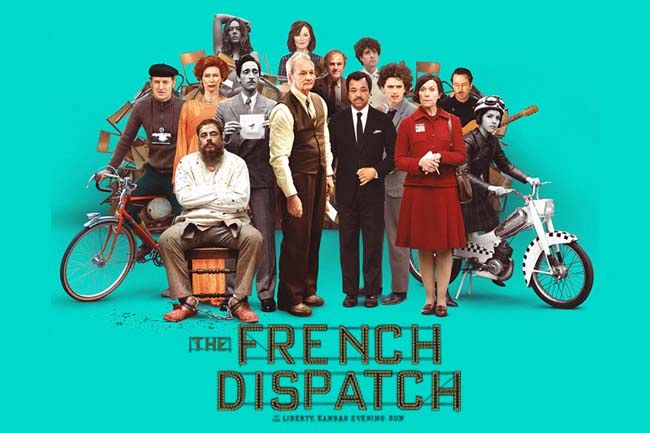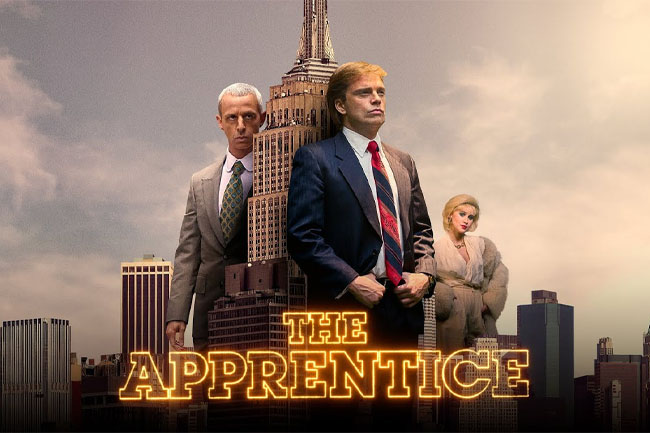A collection of stories come together as a tribute to journalists and editors everywhere. Digital editor Dan Jensen takes a look at Wes Anderson's new film, now streaming on Disney Plus.
IF YOU EVER need a definition of the word “whimsical”, The French Dispatch by writer/director Wes Anderson is just that. It’s artful, it’s eccentric, it’s fantastical and unique. And even for those who prefer entertainment over art, there’s something for most viewers to appreciate here.
Set in the fictional French town of Ennui-sur-Blasé (literally, “boredom on apathetic”), Arthur Howitzer Jr (Bill Murray), editor of the magazine The French Dispatch, dies of a heart attack. According to the wishes expressed in his will, publication of the magazine is immediately suspended following one final farewell issue, in which three articles are published along with an obituary.
The three stories are an odd bunch. Set in various periods of the 20th Century, they cover an artist who discovers fame from the confines of his cell in a prison asylum, a student protester who becomes a revolutionary and the tale of a police commissioner’s son who is kidnapped and held for ransom. And the cast bringing these characters to life is one of the biggest ever assembled, featuring way too many A-list names to list here.
Wes Anderson’s films aren’t for everyone. He’s one of those directors who is more of an auteur and an artist than your typical filmmaker. There are some who find his films to be a tad obnoxious, but then some celebrate him as one of the greatest directors working in Hollywood today. Like many artists, his work divides opinions.
The French Dispatch does, at times, go full “Wes Anderson”. Don’t expect natural dialogue or performances, familiarity in the set designs or camera movement that goes unnoticed. Everything about the film lets you know that this is visual art in every scene, but that’s not a bad thing. Film can be artistic and doesn’t always have to feature realistic conversations between characters. There are even times when backgrounds in this film are visibly moved aside, like watching live theatre.
The artistic vision is the biggest area where The French Dispatch shines. Every frame of this film is captivating, from the colour palette to the composition. Even if the story doesn’t draw you in, it’s near impossible not to be hypnotised by the visuals. And every single thing is carefully composited in each frame — from the actors to the props and set pieces, everything is arranged in a way that shows great attention to detail.
The film was shot in the southwest of France to lend authenticity to the setting. The production design is magnificent — everything from the costumes to the architecture all feels as though it belongs in the various decades in which the stories are set. And the score by Alexandre Desplat is outstanding, featuring a delightfully French feel among moments of drama, comedy and suspense.
And at its heart, the film is a love letter to journalism everywhere. Inspired by Anderson’s love of The New Yorker, some of the characters and stories are based on real-life events and people. It reminds us not only of the importance of the role journalists play in our world, but of what these people can sometimes go through in order to bring us stories. It also offers a glimpse into the importance of a good editor and the role they play in shaping a publication to the best it can be.
So there is a lot to appreciate about The French Dispatch, but as previously stated, like with all art, it won’t quite appeal to everyone. There are many times when the film leans heavily into style-over-substance and Wes Anderson becomes a little overconfident in his craft. Of the three stories, the first one is the most engaging. The second, involving student protests, feels a tad convoluted and strange. The third has an entertaining plot, but sometimes features 2D animated scenes for no apparent reason. It's fun, but it does feel a little too weird.
There are also some scenes throughout the film that switch from black and white to colour (and back again) for no reason. No doubt, Wes felt like he knew what he was doing, but those ideas don’t translate through the screen and come off feeling pretentious.
Casual movie fans who are used to traditional Hollywood-style films are going to be well out of their comfort zones with this film. But for those willing to take the ride, or for anyone who is a fan of Anderson’s work, The French Dispatch is a fun (and often funny), heartfelt tribute to journalists everywhere.

The French Dispatch is now streaming on Disney Plus.
You can follow digital editor Dan Jensen on Twitter @danjensenmovies or check out his YouTube channel, Movie Talk with Dan Jensen.
Follow Independent Australia on Twitter @independentaus and on Facebook HERE.
Related Articles
- As our world grows darker, along comes The Batman
- Cashing in on Christ — The Eyes of Tammy Faye
- Why 'The Company You Keep' matters
- WHAT'S ON: Ghostbusters Afterlife — the legacy lives on
- WHAT'S ON: Matrix Resurrections — more sleeping pill than red pill
 This work is licensed under a Creative Commons Attribution-NonCommercial-NoDerivs 3.0 Australia License
This work is licensed under a Creative Commons Attribution-NonCommercial-NoDerivs 3.0 Australia License
Support independent journalism Subscribe to IA.












